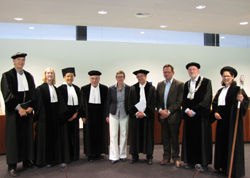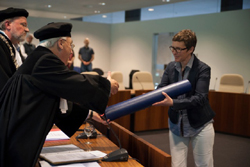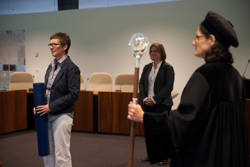Susanne Lucie Bauer
DISSERTATION TITLE:
Dialogues for Knowledge and Development: The Case of International Development Cooperation in the Middle East and North Africa (MENA)
May 2013
Purpose of this Study:
As an introductory note, my belief in what is ‘good’ and ‘real’ is to trust the sense of meaning, value and action through the co-creation of relational practices. Only when conducting this research, I started to understand that the concept of dialogue carries two fundamentally different meanings to be distinguished: first of all, dialogue in international development cooperation (IDC) refers to organisational formats of conferences, workshops or research events that aim to expand knowledge by dialoguing on thematic topics. The starting point for basically each IDC project is the problem to be identified. Dialogue is therefore used as an instrumental tool to adressing problems and finding solutions by means of conducting dialogue from an operational perspective, often in high-level fora. For my research on IDC in MENA, I will call this type ‚IDC dialogue’.
Secondly, dialogue in conducting appreciative inquiry (AI) for relational practices is meant to sharing working practices with the aim to creating meaning together. Here, the process of involving individuals, groups or entire communities is to bring about change. In conjunction with AI, the community of practice (CoP) approach allows to share the ‚what’ and the ‚why’ in the context of consultancy limits, boarders and opportunities in MENA. I will therefore introduce AI as the language that has the potential to let people express their situation and their ideas for the future in their own words, and explain the AI methodology together with the approach of communities of practice (CoP). I will call this type ‚AI dialogue’.
In distinguishing between these two meanings for dialogue, the first emphasis of my study is to clarify this differentiation to be made. This will enable me to analysing the different forms of dialogue in the MENA context where these two types of meanings are of relevance. In a second emphasis, based on my professional experience as an AI practitioner who mainly works in IDC, I had entered the AI-based dialogic approach applied for the MENA context. So my urge for attention implies both the theoretical sources of IDC dialogues and AI dialogues conducted in the MENA region. Technically, the purpose of my research is beyond the duration of programmes and projects. It encompasses the trends for dialogue and reform in MENA in its current potential to merge tradition and modernity in contemporanean practice.
Religion is considered of less relevance to conducting this research, because Islamic studies or religious aspects are not in the focus of my study. Instead, I have chosen an interdisciplinary methodology that enables me to discuss the conceptual importance of dialogue in the MENA region in IDC as well as in AI-based formats. Using the mix of qualitative content analysis and research bodies spelled out above, I follow the academic concepts of area studies as one focus, and behavioural and societal studies as the other focus.



